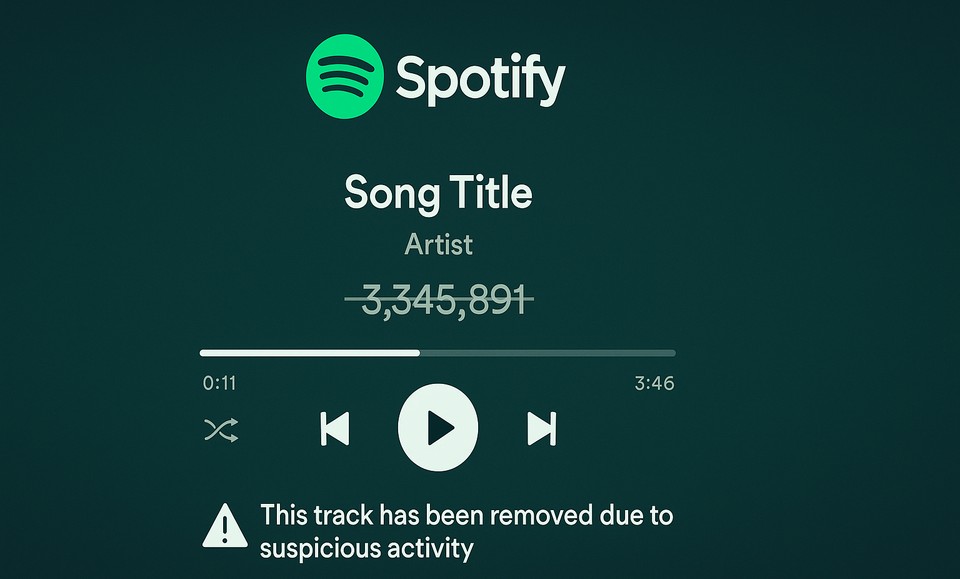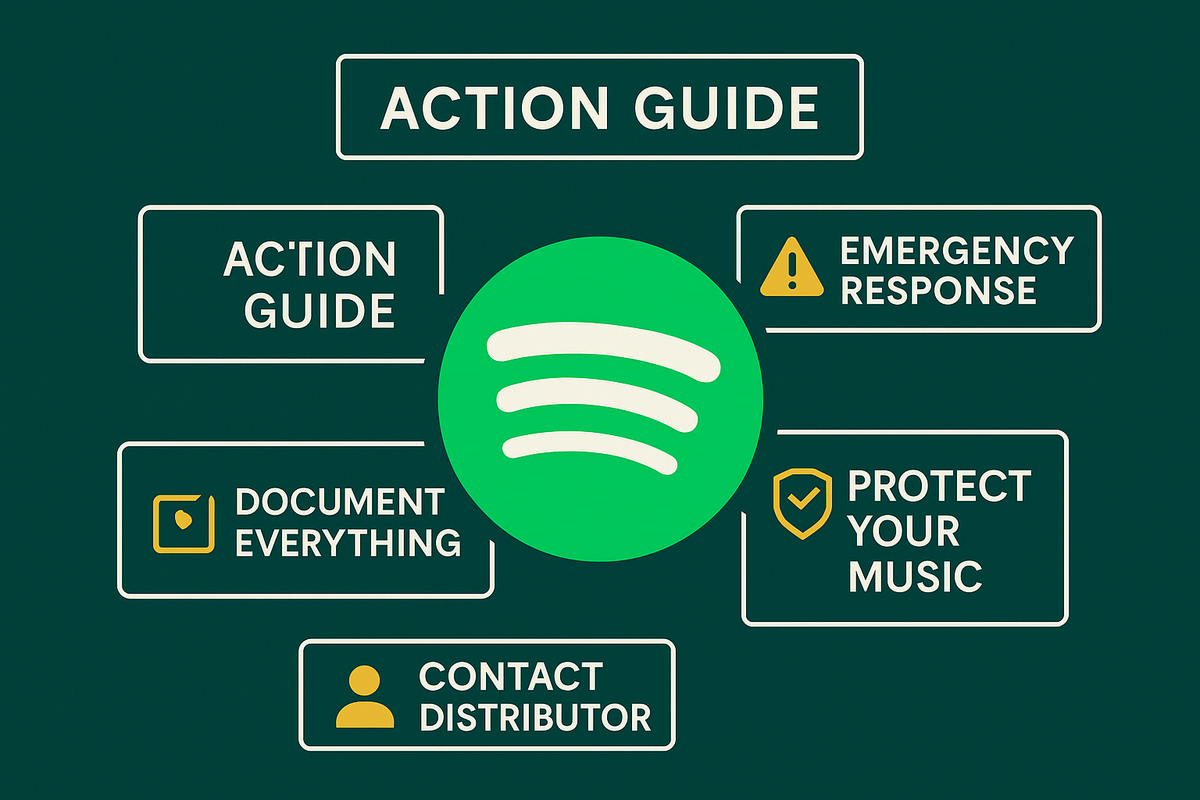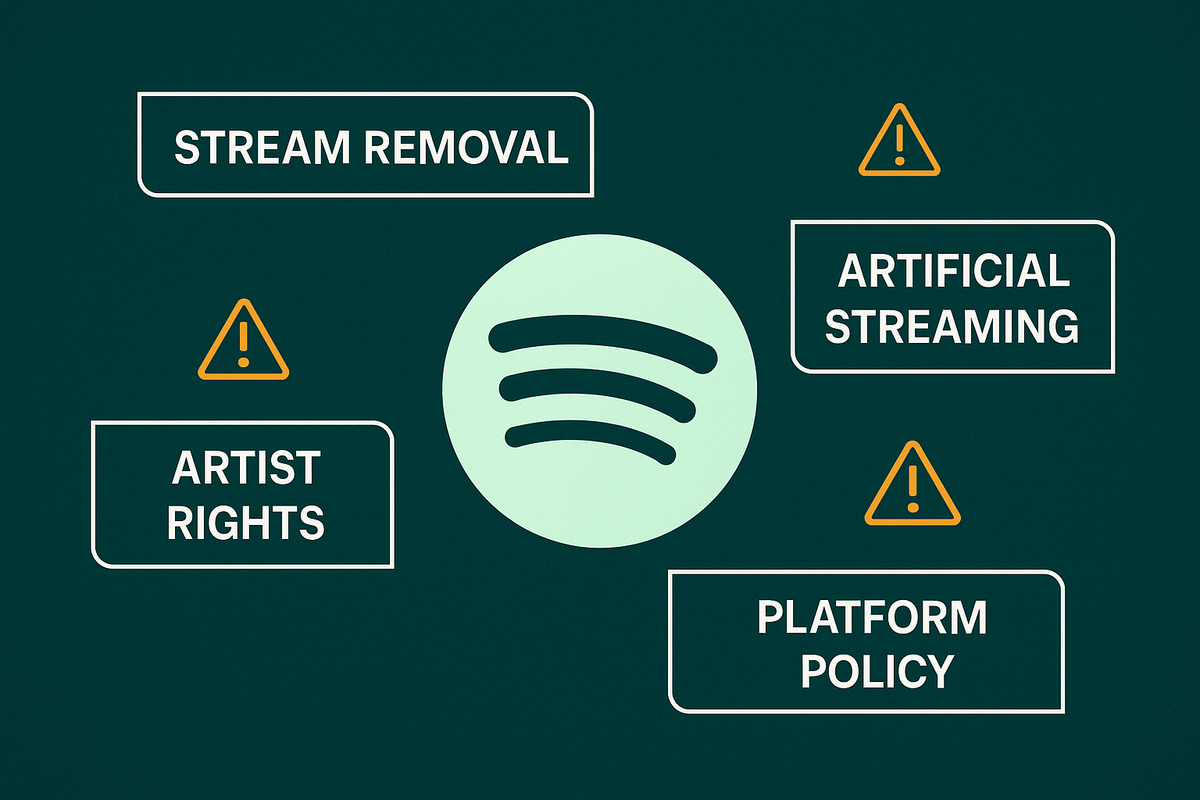When Streams Disappear: What Artists Should Know About Spotify’s Artificial Stream Removals

Introduction
Imagine waking up to find that thousands—or even millions—of streams have vanished from your Spotify stats overnight. No warning, no explanation. Just gone. For many independent artists and labels, this isn’t fiction—it’s 2025.
Spotify has intensified its efforts to crack down on artificial streaming. While the goal of protecting the ecosystem is valid, the execution has raised serious concerns about transparency, fairness, and the lack of communication with affected rights holders.
This article unpacks the facts, the blind spots, and what independent creators can do to stay protected.
The Situation: Streams Removed, No Explanation Given
Since early April 2025, Spotify has removed streams it considers “artificial” at an unprecedented scale. While fighting fraud is part of any platform’s integrity strategy, the lack of clarity around these takedowns has led to widespread confusion.
Artists have reported:
- Sudden drops in streaming numbers
- Emails citing “artificial activity” without evidence
- Conflicting signals (e.g. playlist success followed by takedown notices)
- No way to appeal or clarify the data
Example: Nigerian superstar Davido reportedly lost over 18 million streams due to a recent purge—without clear justification from Spotify. (Hot97)
What Does “Artificial Streaming” Mean?
Spotify defines artificial streaming as manipulated activity that artificially inflates play counts. (Spotify: Artificial Streaming)
This may include:
- Paid click farms
- Bots simulating listening behavior
- “Boost groups” or incentivized playlist schemes
- Hidden autoplay setups (e.g. embedded players)
It’s like using fake followers on social media: tempting for visibility, but toxic for long-term trust.
Fair enough. But the problem is:
Spotify doesn’t share how it detects this activity. Nor does it distinguish between fraudulent behavior and possible algorithmic false positives—such as viral spikes, embedded players, or misunderstood user habits.
The Real Problem: Intransparency
The core frustration among artists and managers isn’t that Spotify monitors fraud – but that there’s no clear process, no evidence, and no appeal system.
One case involved the Dutch band Smalts, who received a Spotify editorial “congratulations” email—only to see their song removed for artificial activity days later. (Medium)
Many artists fear their legitimate fans or playlist placements are being misinterpreted. Worse: these removals often affect royalty payouts and playlist eligibility, even when the artist had no knowledge of wrongdoing.
What Can Independent Artists & Labels Do?
While there’s no guaranteed way to avoid false flags, there are proactive steps to reduce risk and stay in control:
- Avoid dishonest promo services: If it sounds too good to be true, it probably is not true. Never pay for playlisting that promises guaranteed streams.
- Monitor your data: Use Spotify for Artists, Chartmetric, or Songstats to track where your streams come from. Sudden spikes? Unusual territories? Investigate.
- Choose your distributor carefully: Work with partners that offer support in case of disputes. Some distributors are more responsive than others when Spotify flags content.
- Diversify platforms: Don’t depend solely on Spotify. Build a presence on YouTube Music, Apple Music, Beatport, and use email lists or Discord to stay connected to your fanbase.
- Document everything: Save emails, playlist links, and campaign data. If you ever need to explain your traffic patterns, these will help.
What Spotify Should Do
- Introduce a transparent flagging and appeal system
- Share clearer detection criteria (without compromising security)
- Notify artists before removing payouts or playlist eligibility
Fraud protection matters—but so does fairness.
The Hidden Cost of “Artificial Streaming”: What Really Happens
When Spotify detects unusual or manipulated streaming activity, it doesn’t take the track down—but it does trigger a chain of financial and algorithmic consequences that many artists aren’t aware of.
How It Works
Spotify runs monthly audits to detect artificial activity. If more than 90% of a track’s streams in a given month are flagged as artificial, Spotify reports the issue to the distribution platform as a likely penalty case.
One month later—when Spotify issues its royalty statements to the distributor—the flagged streams are excluded from payouts, and a penalty fee is applied.
That means:
- The affected streams for that month are disqualified and not paid out
- A penalty fee of 10 USD/EUR per track is charged by Spotify to the distributor
- This fee is passed on to the label or artist, often without recourse or prior notice
- For distributors, this is not only a penalty risk but also a real revenue loss: their percentage share of the disqualified royalties disappears as well. To offset this, many distributors or labels add their own handling fee on top of Spotify’s charge. In practice, this means the actual cost per flagged track can be significantly higher than Spotify’s base penalty.
Even though the track remains live and future streams can still be monetized, it may lose its visibility inside the platform:
- It can be excluded from algorithmic playlists like Radio, Autoplay, or Daily Mix
- It may become ineligible for Discovery Mode
- Editorial opportunities may be impacted by internal trust scoring
Repeat Offenses: The Real Risk
If such penalties occur repeatedly, most distributors will invoke their right to terminate the distribution agreement.
In such cases, they may remove all affected releases from the platforms—regardless of whether Spotify requested it or not.
In short: Spotify removes the money. Your distributor removes the music. And in between, independent artists lose both revenue and reach—often without understanding what triggered it.
Related: Spotify’s 1,000-Stream Payout Rule (2024 Update)
Since 2024, Spotify requires a minimum of 1,000 streams per track in 12 months before royalties are paid.
Read our full guide here
How Widespread Is Spotify’s Stream Removal in 2025?
Spotify does not publish official numbers on the total volume of removed streams. However, industry sources, data trackers, and artists themselves confirm that the scale is massive in 2025:
- K-pop stars such as BTS’s Jimin reportedly lost up to 200 million streams on a single song within a few months.
- BLACKPINK’s Rosé and Jennie each saw between 2 and 15 million streams per track removed.
- Afrobeats superstar Davido experienced stream losses well into the tens of millions. (Hot97)
- Data tracking accounts like chart data on X (Twitter) have documented major stream drop events every month across multiple genres.
The real number of impacted streams is likely much higher, as many cases go unreported.
Final Thoughts
Fighting fraud is essential—but so is transparency.
Spotify’s current system leaves many independent artists uncertain, without clear tools to understand or respond to takedowns. In a time when every stream matters, this uncertainty can impact both confidence and planning.
That’s why the smartest strategy is a balanced one—combining platform compliance, informed release tactics, and a presence that reaches beyond any single algorithm.
Quick FAQ – Spotify Stream Removals
1. Why did Spotify remove my streams?
Spotify removes streams it considers “artificial” based on internal detection systems. This includes bot plays, paid playlist placements, or suspicious listening patterns.
2. Will my music be removed after a violation?
No – the tracks stay live, but affected streams are unpaid and visibility on playlists or algorithms may drop significantly.
3. Why doesn’t Spotify provide details or evidence?
Spotify does not disclose detection methods, even to artists or distributors, citing internal policy and system security.
4. How can independent artists reduce the risk of being flagged?
Avoid shady promo services, document your campaigns, and work with a distributor that actively supports dispute resolution.
“Already facing stream removals? Read our quick-response guide (including checklist as pdf) to protect your catalog and act fast.”


Want to dive deeper into Spotify’s rules, payouts, and strategies?
Browse all related guides here → Spotify Insights & Guides
“If you’re looking for a reliable way to distribute your music to Major Platforms , NexaTunes offers direct distribution with transparent terms. Learn more here → NexaTunes-Distribution”
Get in touch for more information using our livechat


